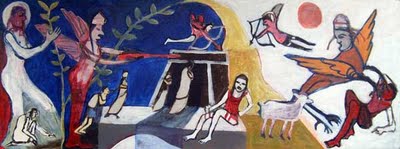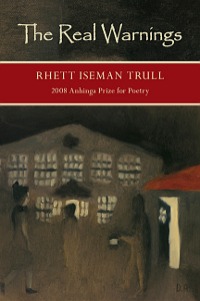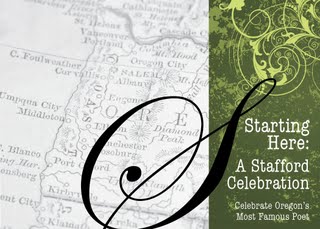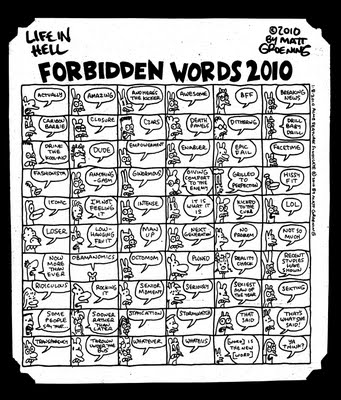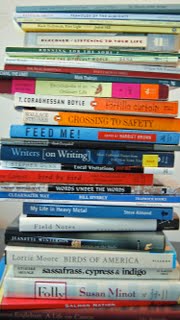We have a winner!
Congratulations to Laura Rodley, winner of The Real Warnings, a book of poems by Rhett Iseman Trull.
Powerless and poor
"If he'd said it of Jews, he would still be apologizing.If he'd said it of blacks, he'd be on BET, begging absolution.If he'd said it of women, the National Organization for Womenwould have his carcass turning slowly on a spit over an open flame.But he said it of the poor, so he got away with it. . . . read more
Last Chance
Something to celebrate
Writer Revealed: Rhett Iseman Trull
I want to go back to the winter I was born and warn you
that I will flood through your life like acid
and you will burn yourselves on me
— from The Real Warnings Are Always Too Late
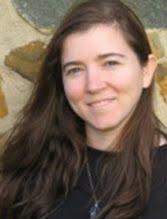
Rhett Iseman Trull's first book of poetry, The Real Warnings was published last fall and won the 2008 Anhinga Prize for Poetry. Her poems have appeared in numerous publications, including American Poetry Review, Best New Poets 2008, and Prairie Schooner. She received her M.F.A. from the University of North Carolina at Greensboro where she was a Randall Jarrell Fellow. She and her husband publish the literary journal Cave Wall in Greensboro, North Carolina.
Q. In choosing your book for the 2008 Anhinga Prize for Poetry, Sheryl St. Germain says “Open this book up anywhere and you'll find a poem of fierce and uncompromising energy and insight . . . I've never read a poet who understands more fully the brutal paradoxes of love and of loving damaged things.” What influences or inspirations led you to poetry, and to these ‘fierce’ poems?

My biggest influence always has been reading. In fact, before I could read, I used to listen to my storybook record of Disney’s The Fox and the Hound over and over. I can quote it still: near the end, there’s this moment that goes, “Sometimes, on warm summer nights, Tod and Vixey would leave the forest and climb the hill overlooking Copper’s house. As Tod looked fondly down at his friend, the voices of a little fox and a little hound seemed to echo in the breeze…”
That sentence did something to me as a child. I could feel the words go straight to my heart and move me in some mysterious and vital way. And I think all of my writing, ever since, has been an attempt to recapture the kind of feeling that ran through me when I first heard those words.
I started by writing short stories and novels. But when I was twelve, I discovered poetry. I was in a summer musical, Annie. I got to be an orphan because I was little and cute, not because I could sing. I wanted to sing, though. I yearned for that world of musicals. More than anything, I wanted to be a Broadway star, but I knew I didn’t have the talent for that path. Singing in musicals lit that same fire the The Fox and the Hound ending did. I think what led me to poetry was that need to sing.
An older girl in the musical that summer showed me her notebook of poems, which she used as a kind of journaling device, pouring her deepest wishes and pains into these poems. I had never thought of poetry that way, as a kind of whole-body song on paper. I was hooked. I went home and started my own poetry notebook.
I like that word Sheryl St. Germain used: “fierce.” I’m honored by that word. Emotions that are fierce are hard to capture in language, and yet that’s why I write poems: that driving need to try to turn whatever I feel with ferocity into some kind of music.
What is your favorite poem in this collection? Why?
That’s a tough one because each poem is special to me for different reasons, and my favorite of the moment changes often. Right now, Heart by Heart the House is my favorite, I think. I wrote it as a challenge and promise to myself to try to live more in the moment. I tend to be a catastrophic thinker, always worried about what awful thing is going to happen next. Most of us live that way, with our minds more in the future or past than the present. I’m learning to love the moment and enjoy the moment more. Heart by Heart the House is a kind of love poem to my husband, Jeff, and to our life, to my life in the moment.
How do you support your poetry habit? Do you have a ‘day job’?
Right now, my “day job” is the non-paying day-and-night job of publishing a poetry journal, Cave Wall. But over the past six years, while trying to complete and polish the poems in The Real Warnings, I’ve had several jobs, from teaching undergraduates at University of North Carolina at Greensboro, to working in my local comic book shop, Acme Comics. I miss teaching and hope to return to it soon.
You are the editor of Cave Wall, a literary journal. How do you balance your work promoting and publishing other writers with your need to do your own writing and promote yourself?
I love working on Cave Wall. I love every aspect of it: discovering poems and art that move me, figuring out the best layout, mailing a finished issue into the world, calling bookstores, opening the mailbox to find a huge stack of submissions. I spend more time on Cave Wall than on anything else in my life. And although it has taken away from my own writing time, I think it’s helped me grow as writer. It’s led me to appreciate more the moments I do have to work on my own writing so that I use that time more wisely.
Before I started Cave Wall, I was putting a lot of pressure on myself, feeling extra critical of every word I wrote. I still get that way sometimes, but Cave Wall has connected me with so many poetry-lovers and poets—not just those we end up publishing but all those who submit their work and all our readers—that gratitude has swept over me and outshined the self-anger and frustration. My writing now comes from a better place inside me. And just realizing how huge and varied the world of poetry is has inspired me. So I think the loss of some writing time is a small price to pay for that feeling of gratitude, inspiration, and awe that Cave Wall has awakened in me.
Balance is difficult both to achieve and to maintain. As soon as one finds it, watch out: something else is just around the corner, coming at you, and you will have to learn to balance all over again. But my advice to all writers out there who are trying to juggle many things (jobs, family, kids, etc.) is to try to catch the frustration as it rises and turn it into gratitude. It’s easier and more fulfilling to write from a place of gratitude.
What poets would you like to emulate? What fiction has your interest?
I have way too many favorite writers to name here, but I will list some. I read a thousand times more than I write, in all styles and all genres. In fact, if I say I’m going to sit down and write this afternoon, that means I’m going to sit down with a stack of books and read and hope something moves me to write. Some of the poets whose work I return to often are Elizabeth Bishop, Mark Doty, Christine Garren, Jack Gilbert (especially The Great Fires), Jeffrey Harrison, Edward Hirsch (especially Wild Gratitude), Richard Hugo, A. Van Jordan, William Matthews, Theodore Roethke, William Butler Yeats, Robert Wrigley (especially Lives of the Animals), Adam Zagajewski.
Lately, I’ve been learning a lot from the poetry of Robert Dana, Sarah Lindsay, Erika Meitner, Jud Mitcham, Liz Robbins, Alison Stine, Natasha Trethewey, Cecilia Woloch…you can’t go wrong with any of those. My favorite novels include Corelli’s Mandolin by Louis de Bernieres, A Prayer for Owen Meany by John Irving, Bel Canto by Ann Patchett, Housekeeping by Marilyn Robinson, East of Eden by John Steinbeck, Mrs. Dalloway by Virginia Woolf.
I love short stories, as well, and have been spending a lot of time lately with beautiful stories by Holly Goddard Jones and Kevin Wilson. Also, one of the best short stories I’ve read recently was published earlier this year in the journal One Story. It’s called Hurt People by Cote Smith. I think it was his first published story, and I can’t wait for more by him.
I read many comic books, as well. My favorite recent titles are Alias by Brian Michael Bendis, Cassanova by Matt Fraction, Y the Last Man by Brian K. Vaughn, and Fables by Bill Willingham.
I’m a collector of words and often have my students collect words, too. Do you have any favorite words?
The words that come to mind are the names of my cats: Charm, Chulita, and Pita; and Chulita’s nickname, Boombadoom. That’s weird. Maybe it’s because I say those words more often than other words throughout the day and associate them with happiness. Theodore Roethke wrote that poetry is giving a cat its right name, or something like that. So yeah, I’m gonna go with: Chulita, Pita, Charm.
You’ve done many interviews and readings since your book was published. What question hasn’t been asked that you’d like to answer?
I haven’t been asked about the importance of revision. For me, the majority of the writing process, and the place where the magic happens, is revision. It’s not unusual for me to work on a poem for years before it’s ready for an audience.
There’s a sequence of poems in my book called Rescuing Princess Zelda. It’s made up of nine poems that take place in the adolescent wing of a state mental institution. From start to finish, I worked on that series for ten years. When I wrote the first poems for it, I didn’t know it was a series, so I guess I should clarify that I worked on the poems in it for ten years and worked on it as a series for about six years. I’m not quick to let go of a poem. I like to slow down, let a poem sit in a drawer for awhile, and return to it many times over many months to see what emerges.
Every now and then a poem will spill out almost whole, almost polished, in a first draft. This happens for me with maybe one out of every 25 poems I write. And that’s a great feeling, a boost in confidence and energy.
But I think, maybe, the more rewarding feeling for me is when a poem I’ve worked on for months, even years, comes together and all that time spent pouring over dictionaries and research, all that time switching around the syntax, pays off. The majority of my poems need that kind of time to find their right shape and language. I am a big believer in the transformative gifs that come from time and distance.
WIN a copy of The Real Warnings
It's easy. To enter, simply write a comment below, or send an email to dcm@drewmyron.com. Provide your name and contact information. A winner will be selected at random from the entries. But hurry! All entries must be received by January 30, 2010.
Crack
Ring the bells that still can ring
Forget your perfect offering
There is a crack, a crack in everything
That's how the light gets in.
— Leonard Cohen, from Anthem
And the winner is . . .
In the drawing for a consultation with book marketing coach Liz Nakazawa, the lucky winner is Jennifer Jeanelle. Congratulations!
Have a suggestion for our next Fast Chat Friday? These informal, end-of-week interviews feature writers, publishers, editors and other creatives. Feel free to send me your suggestions.
Forbidden Words
Show up
Hope begins in the dark, the stubborn hope that if you just show up and try to do the right thing, the dawn will come.— Anne Lamott
Fast Chat Friday: Liz Nakazawa
 I'm happy to kick off the first edition of Fast Chat Friday, a series of informal end-of-week interviews with writers, publishers, editors and other creatives. This week, you can win a free consultation with book marketing coach Liz Nakazawa. Simply enjoy the chat, then add your name and a comment to be entered in the drawing.
I'm happy to kick off the first edition of Fast Chat Friday, a series of informal end-of-week interviews with writers, publishers, editors and other creatives. This week, you can win a free consultation with book marketing coach Liz Nakazawa. Simply enjoy the chat, then add your name and a comment to be entered in the drawing.
Liz’s book publishing and promoting career began by publishing of her own work, Deer Drink the Moon: Poems of Oregon, which was named one of the 150 books for the Oregon Sesquicentennial.
Let’s talk first about book marketing. What can you offer authors that they can’t do themselves?
I help authors think outside the "bookstore box" and help them discover different approaches to marketing. For instance, one of my clients wrote a book about the importance of fathers in our lives and he markets mainly to Rotary Clubs all over Oregon. That is his target market as those clubs are very family oriented.
What’s the best thing authors can do to get readers to their book?
The best approach for authors is to do one thing every day to market their book, their gift to the world. There isn't one best approach. Marketing needs to be done on many levels. It is great to market to bookstores but there are 144,000 libraries in the U.S. and that is a huge market. In my classes I discuss the best way to approach libraries. In addition to public libraries there are also academic libraries, prison libraries and many other kinds of libraries.
I like your idea of a strategic plan. In terms of marketing, is there a common miss or mistake you see authors make? Conversely, is there a brilliant move you'd like to see more?
There are two marketing mistakes authors make. One is thinking that you have to spend a lot of money marketing. Many authors spend hundreds of dollars sending slick, multi-page marketing materials to libraries and bookstores by snail mail, a costly decision. A one-page book sheet done as a PDF suffices. This can be then be sent to any prospective buyer. The other mistake is underestimating how interested libraries and bookstores will be in your book. Many libraries, for instance, love local authors and are eager to purchase your book. Do not give it away for free!
As a book editor, you created Deer Drink the Moon, a wonderful collection of work by 33 Oregon poets that “celebrates the state (and state of mind) of Oregon.” How did you come to this project, and to poetry?
I attended a poetry reading honoring our state's late poet laureate, William Stafford. Someone read a very wet-sounding poem, an ocean poem, and then someone read a very dry sounding poem, one set in eastern Oregon. At that moment I thought, "Why not gather poems that reflect the geography, flora and fauna of our diverse state" These poets in the book are finest in the state.
What’s your next project?
My next project is to write a one-act play about a family dealing with Alzheimer's. I know, that is a very different sort of project!
Forecast: Paintings & Poems
Forecast has come home!
Thanks to you, the word-art collaboration created by Tracy Weil & Drew Myron has had a great run:
• The exhibition traveled from Denver's Weilworks Gallery to Boulder's National Center for Atmospheric Research.
• Poems were read at mountain-top weddings and performed in seaside coffeehouses.
• The Special Edition Exhibition Book is featured in libraries and student classrooms nationwide.
Since its debut in Autumn 2008, you've oohed and ahhhed and asked to purchase and now we are happy to announce:
Many thanks for your support and appreciation. Tracy and I thrive on on creative collaboration, and your encouragement and enthusiasm fuels our art. Thank you!
Gratitude looks best in cursive
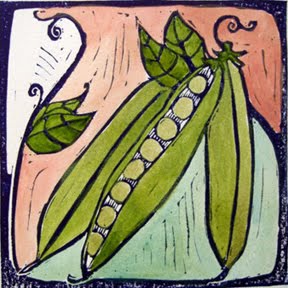 I love January, so full of fresh starts and determination. And I get giddy with the thank you notes this season requires. I love the excuse to write messages — and even full letters! — in a long, careful hand that demands pause and consideration. Because I was three steps behind this entire holiday, I'm using thank you notes as a replacement for the Christmas cards I intended to, but never did, send. Now I get to take my time and pick a card to match each recipient. Funky? Formal? Lined and structured, or scrappy and handmade?
I love January, so full of fresh starts and determination. And I get giddy with the thank you notes this season requires. I love the excuse to write messages — and even full letters! — in a long, careful hand that demands pause and consideration. Because I was three steps behind this entire holiday, I'm using thank you notes as a replacement for the Christmas cards I intended to, but never did, send. Now I get to take my time and pick a card to match each recipient. Funky? Formal? Lined and structured, or scrappy and handmade?
At this end
Burning the Old Year
Sent with love
Wordful creation
More Wishes
Wish List of Books

Give me the words
I can't shake this song.


